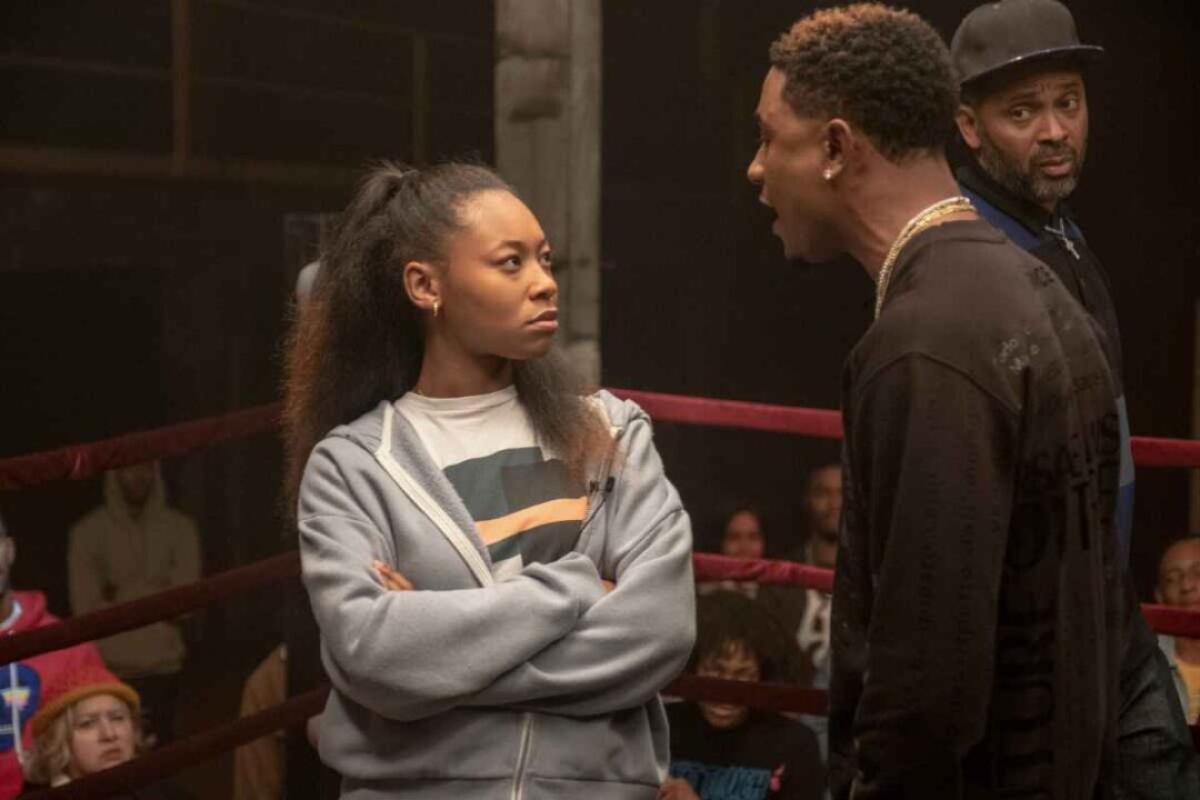Review: Don’t look for a meaningful portrayal of Black life in messy, derivative drama ‘On the Come Up’

“Y’all could’ve killed me for a pack of Skittles!” These are the rightfully angry words of 16-year-old Bri (Jamila C. Grey), a talented young rapper who — after clandestinely selling candy to her peers at her majority-white high school — is targeted for attack by the school’s overzealous and violent security guards. It is also one of several moments in actor-turned-director Sanaa Lathan’s feature debut, “On the Come Up,” that, in an attempt to imbue its story world with some sort of meaningful politics, glibly references the murder of Trayvon Martin.
Martin is, of course, only one of many, but is invoked as a kind of catch-all representative of Black youth who endure racialized violence at the hands of officers. Lathan’s film, adapted from the 2019 novel of the same name by “The Hate U Give” author Angie Thomas, positions itself as a coming-of-age drama following young Bri as she navigates the world of battle rapping in the fictional housing projects of Garden Heights. Unfortunately, it is these exact kinds of hollow parallels that make up the bulk of its presupposed substance.
For your safety
The Times is committed to reviewing theatrical film releases during the COVID-19 pandemic. Because moviegoing carries risks during this time, we remind readers to follow health and safety guidelines as outlined by the CDC and local health officials.
Bri is the daughter of late rapper and beloved neighborhood figure Lawless, who was killed just as he was on the verge of even greater success. Her mother, Jay (Sanaa Lathan), is a handful of years into her recovery from drug use, a fact that is often cruelly thrown in Bri’s face when she faces other battle rappers in the (literal) ring. Precarity patterns the entirety of Bri’s life, from the absence of Jay during her childhood to her older brother having to drop out of his master’s program in order to help support their family.
It’s made clear that while Bri has both the lyrical chops and spirit to carry on her father’s legacy, the urgency of her day-to-day life is closing in on her motivations as a rapper. After decimating a former local rapper turned mainstream success named Milez (Justin Martin) in the the battle ring, Bri is introduced to Supreme (Method Man), a savvy manager quick to extend resources that the young girl and her family so desperately need. Also within this orbit is Bri’s aunt Pooh (Da’Vine Joy Rudolph), her manager and mentor who is quick to talk about her hustle without quite enough to actually show for it.
With a story this well-trodden, exhausted even, the contributions that “On the Come Up” makes are too limited. It feels dated, both in scope and in form. Characters here are reduced to cliché stereotypes, a fact all the more ironic given that Lathan’s film is quick to use such stereotypes to shape the heart of its story. With the exception of a handful of scenes focused on Bri and her friends and family in more intimate moments, the film’s dialogue and plotting are obvious and lacking in both identity and dynamism.
There is a lifelessness to “On the Come Up” and in comparison to other well-received, if not classic, movies from the recent past that cover much of the same trajectories of story and character (“8 Mile” and “Hustle & Flow” in particular come to mind), Lathan’s film lacks soul and spirit. As it musters the energy to drag both its audience and itself across its finish line, it does so seemingly without much belief in itself. Or perhaps more appropriately, a belief that is sorely misguided.
Those familiar with the feature adaptation of “The Hate U Give” will notice the unchanging nature of author Thomas’ politics, the heavy-footed way that they thud about and refuse to refine themselves outside of their own all-too-eager announcement. It is not just Black death, but Black life, that is realized here in the most reductive of forms. At its core, this is a film whose story is most concerned with the twin powers of respectability and authenticity, a reality that also comes to be expressed as an unintended meta-commentary on the work itself.
At best, “On the Come Up” lacks the voice, craft and perspective to reshape its source material; at worst, it is content — even celebratory — of its own undeveloped nature. It is yet another addition to the now-burgeoning output of films that purport to offer meaningful Black stories onscreen, but instead deliver a muddled entanglement of ideas that, frankly, don’t add up to much.
'On the Come Up'
Rated: PG-13, for strong language, sexual references, thematic elements, some violence and drug material
Running time: 1 hour, 56 minutes
Playing: In general release; streaming on Paramount+
More to Read
Only good movies
Get the Indie Focus newsletter, Mark Olsen's weekly guide to the world of cinema.
You may occasionally receive promotional content from the Los Angeles Times.










